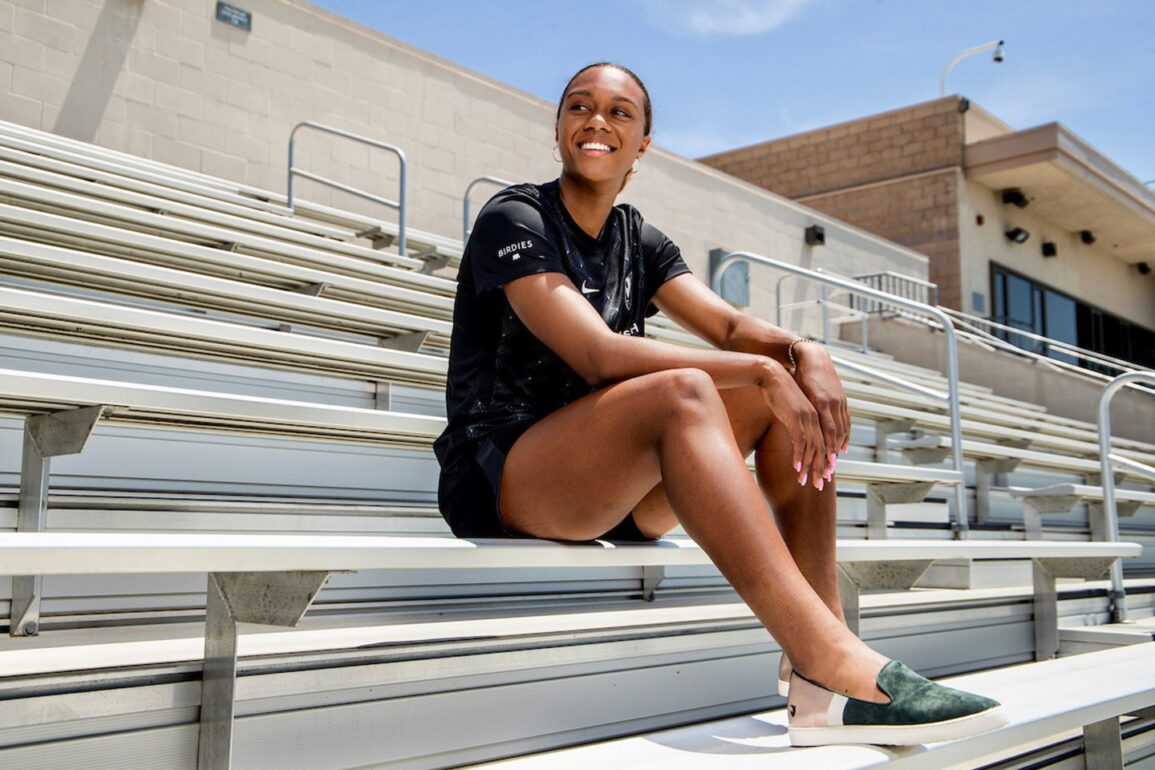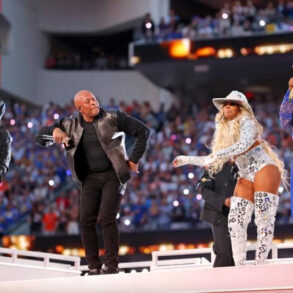Good morning, Broadsheet readers! Unwanted advances push women off LinkedIn, gender parity in business leadership could come by the end of the decade, and a startup lets go of ad metrics for an important sponsorship. Have a great Monday!
– End goal. Before Angel City FC started playing in 2022, the cofounders of the women’s shoes startup Birdies got a call. They didn’t make athletic apparel, but Angel City’s president Julie Uhrman wanted to know if they’d be interested in becoming a sponsor of the new Los Angeles-based women’s soccer team.
It was a compelling—but unusual—offer. Birdies was part of the 2010s generation of direct-to-consumer startups. Founded in 2015, the startup has raised about $10 million in venture funding. Its founders were used to advertising mainly through Instagram and Facebook, with immediate metrics at their fingertips. Now, they were presented with the opportunity to have their company’s name on professional soccer players’ jerseys—a much harder-to-measure form of advertising.
Courtesy of Birdies
“It is unusual when you look at it just on paper,” says Birdies cofounder and CEO Bianca Gates. “We’re not in the business of making athletic apparel.”
“You don’t see a lot of startup fashion companies sponsoring a sports team,” agrees cofounder and president Marisa Sharkey.
And yet, they decided to take the leap and signed a four-year, seven-figure deal. The Birdies name has been emblazoned on the sleeves of Angel City players since they first hit the field in 2022. The deal was part of the $5 million Angel City earned through jersey sponsorships—a number that reportedly pushes the boundaries of sponsorship revenue in women’s sports. Other jersey sponsors include DoorDash, Klarna, and Sprouts Farmers Market.
The startup’s entry into women’s sports went further this month when some of Angel City’s players competed in the Women’s World Cup in Australia. The Birdies cofounders flew to Sydney to participate in Angel City’s Equity House programming during the competition. Then, they rushed onto a flight from Sydney to Melbourne to see the U.S. women play—and ultimately, lose early—in the tournament.
Despite the U.S. Women’s National Team’s loss, the experience has driven home why Birdies decided to become an Angel City sponsor, part of a mission to support women’s empowerment. “We’re literally showing up on the sleeve as a brand that cares about this,” says Sharkey.


Courtesy of Birdies
Birdies’ sponsorship deal has prompted questions from other founders curious about advertising in women’s sports—estimated to be a massive opportunity. Venture capitalist and Angel City cofounder Kara Nortman launched Monarch Collective, a $100 million fund dedicated to investing in women’s sports.
For startup founders, taking on this kind of partnership can be “a bit of a leap,” acknowledges Sharkey. Many sports sponsors are legacy brands, less scared to advertise without immediately measurable results.
“For the founders that are looking to immediately see the impact financially, it’s probably not the right thing to do,” admits Gates. “It’s hard to measure it, but you just have to do it because it’s the right thing to do.”
Emma Hinchliffe
emma.hinchliffe@fortune.com
@_emmahinchliffe
The Broadsheet is Fortune’s newsletter for and about the world’s most powerful women. Today’s edition was curated by Joseph Abrams. Subscribe here.
ALSO IN THE HEADLINES
– Creepy contacts. A new survey of 1,000 women who use LinkedIn at least once a week found that up to 91% have received romantic messages from other users. Of the women who received advances, 74% said it caused them to use the social media platform less. Fast Company
– Gender parity predictions. If the percentage of women in C-suite roles and board seats continues to jump year to year, S&P projects that women will hold half of corporate leadership positions as early as 2030. Other evaluations, however, are more pessimistic: the World Economic Forum estimates economic and political parity is still 131 years away. Fortune
– A personal bailout. All eyes are on Yang Huiyan, chair of Country Garden, a Chinese property developer whose unpaid debt could push the country further into a real estate crisis. Investors are wondering if Yang, once China’s richest woman, will fork over her own cash to bail out the company. Business Insider
– Funding farmers. Democratic women lawmakers are pushing to secure funding for female farmers as part of the Inflation Reduction Act, which sets aside funds for farmers who’ve faced discrimination. In a letter to the agriculture secretary, Reps. Chellie Pingree of Maine, Lois Frankel of Florida, and Jahana Hayes of Connecticut explained the systemic barriers that often block women farmers from financing and land. The 19th
IN CASE YOU MISSED IT
– Leaving a mark. Giorgia Meloni, not even a year into her term as Italy’s prime minister, has prioritized shaking up Italy’s corporate world. By taxing the profits of Italian banks, handpicking politicians to run state companies, and purchasing a stake in Telecom Italia, Meloni is exerting heavy influence on Italy’s economy. Bloomberg
– The C-suite at home. Married couples are coming up with a new way to define their division of household labor: CFO and COO. In a move from the corporate playbook, one person is taking on budgeting and financial planning while the other handles logistics and scheduling. Wall Street Journal
– Wartime harassment. Hanna Maliar, Ukraine’s deputy defense minister, is promising to crack down on sexual harassment in the military after allegations were made by a female platoon sergeant. Platoon sergeant Nadiya Haran claimed that at one point female subordinates were told their husbands would be sent to the frontline if they didn’t have sex with a higher-up. Guardian
ON MY RADAR
Why activist Astra Taylor is not giving up on student loan forgiveness CNBC
Martha Rosler wants to know why we still aren’t outraged New York Times
Can Sarah Silverman’s A.I. lawsuit save us from robot overlords? Vulture
PARTING WORDS
“It was insane. We are not the Beatles.”
—Supermodel Linda Evangelista reflecting on the Vogue cover and music video that projected her and four other supermodels into the spotlight more than 30 years ago
This is the web version of The Broadsheet, a daily newsletter for and about the world’s most powerful women. Sign up to get it delivered free to your inbox.








